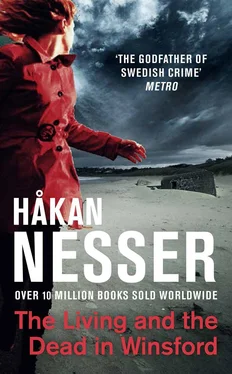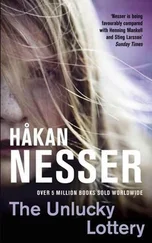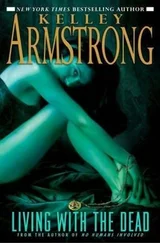Håkan Nesser - The Living and the Dead in Winsford
Здесь есть возможность читать онлайн «Håkan Nesser - The Living and the Dead in Winsford» весь текст электронной книги совершенно бесплатно (целиком полную версию без сокращений). В некоторых случаях можно слушать аудио, скачать через торрент в формате fb2 и присутствует краткое содержание. Год выпуска: 2013, Издательство: Mantle, Жанр: Криминальный детектив, на английском языке. Описание произведения, (предисловие) а так же отзывы посетителей доступны на портале библиотеки ЛибКат.
- Название:The Living and the Dead in Winsford
- Автор:
- Издательство:Mantle
- Жанр:
- Год:2013
- ISBN:нет данных
- Рейтинг книги:4 / 5. Голосов: 1
-
Избранное:Добавить в избранное
- Отзывы:
-
Ваша оценка:
- 80
- 1
- 2
- 3
- 4
- 5
The Living and the Dead in Winsford: краткое содержание, описание и аннотация
Предлагаем к чтению аннотацию, описание, краткое содержание или предисловие (зависит от того, что написал сам автор книги «The Living and the Dead in Winsford»). Если вы не нашли необходимую информацию о книге — напишите в комментариях, мы постараемся отыскать её.
The Living and the Dead in Winsford — читать онлайн бесплатно полную книгу (весь текст) целиком
Ниже представлен текст книги, разбитый по страницам. Система сохранения места последней прочитанной страницы, позволяет с удобством читать онлайн бесплатно книгу «The Living and the Dead in Winsford», без необходимости каждый раз заново искать на чём Вы остановились. Поставьте закладку, и сможете в любой момент перейти на страницу, на которой закончили чтение.
Интервал:
Закладка:
But Castor and I keep plodding along. I think for a while about the lady’s farewell words — a visitor from a long way away — and how appropriate they are. It’s exactly a month since I moved into Darne Lodge — I have a copy of The Times in the car that confirms this; and even if I no longer regard the passing of time like I used to, even if I’m now a sort of desert dweller and an emigrant from all normal life, I couldn’t avoid noticing that they had started decorating for Christmas in Dulverton. We drove through the village on the way here, and as I stood in the queue to pay for my newspaper I saw a poster advertising ‘Dunster by Candlelight’ the coming Saturday — a big event, it seemed.
For normal people.
We trudge up the last long slope to the cairn at the summit, and I entertain the thought that I will never return to Sweden. No, that’s wrong, I don’t entertain the thought because I’ve been doing that to excess for a very long time: it’s the feeling that I entertain now, the discomfort that swells up relentlessly in my midriff. This must be the first time since I came to live on the moor that I have felt such pangs of homesickness, such longing for home.
But longing for what, exactly? If I’m not really longing for anything any more, if I don’t even want to carry on living, why should I long for home? A feeling of belonging, perhaps, of being well known — is this the link I’m fumbling for? Context and security and the reassuring presence of somebody else? But why are such emotions attacking me now on this windswept hillside? We have no future, Castor and I: I shall outlive him and then die, that is the contract we have agreed upon. That we sign up for every day, my dog and I, is that not the case?
I try to shake it off me, whatever it is, but it’s not easy and I know that it was the old lady’s words that started it all off.
A visitor from a long way away.
It could just as well be a description of what is involved in being a human being in this world.
On the way back to Selworthy — we are following a different path now, there are lots of them — we come across a little stone monument. According to an inscription it was raised for a man who liked to walk up to this summit with his children and his grandchildren, talking to them all the time about the beauty and richness of God’s nature surrounding them on all sides. According to the same text, the monument is intended to be a haven where a tired wanderer can rest, protected from the wind: as Castor and I have both coffee and liver chews in our rucksack, we sit down in the lee with the pale but nevertheless warming sunlight shining into our faces. I read a poem on the wall:
Needs no show of mountain hoary,
Winding shore or deepening glen,
Where the landscape in its glory
Teaches truth to wandering men:
Give true hearts but earth and sky,
And some flowers to bloom and die.
Homely scenes and simple views
Lowly thoughts may best infuse.
Even these lines touch me deeply. I really don’t understand why I am so affected and why so many doors to my soul are standing open on this lovely December day, but that’s the way it is. I’m suddenly reminded of the novel A Happy Death by Albert Camus, which both Rolf and I read during the short time we were together and the theme of which we discussed: choosing the time and the place of one’s own death. That dying is the most important moment in life, and hence that one shouldn’t leave its circumstances so casually in the hands of others, as most people do.
Would I like to die here and now? Is that the question that should be occupying my mind? I don’t think so, but perhaps I would like to die on a day like this in a place like this. Perhaps even this very place?
I contemplate Castor as he lies stretched out on the ground in the sunshine. I contemplate England’s most beautiful valley in all its glory. I listen to the wind in the treetops, and it occurs to me that as long as we live we shall never be able to ignore the passage of time, nor the Christmas decorations in Dunster, nor what we are guilty of having done.
That is why we need the door of death through which we can take our leave.
The sun is swallowed by clouds. Castor sits up and stares at me. It’s time to go back to the car.
*
There are two vehicles in the car park next to Selworthy’s white-painted church. One is my rather dirty dark blue Audi, the other is a silver-coloured Renault with a badge indicating it is from the rental firm Sixt. Despite the fact that there are at least ten empty spaces, the driver has parked it so close to my car that I can barely open the driver’s door and squeeze my way in.
It is while I am performing this difficult manoeuvre that I notice the newspapers lying on the dashboard just above the steering wheel of the rental car — it is right-hand drive, whereas mine is left-hand drive. There are two papers and I recognize both of them: one is the Swedish Dagens Nyheter , and the other the Polish Gazeta Wyborcza .
I manage to sit down in the driver’s seat and close the door behind me. I look around. No sign of anybody. I start the engine and drive away. My heart is beating fast: I know that this is one of my vulnerable days, and I hope the fear that took possession of me in a flash will fade away provided I don’t feed it with unnecessary thoughts. As long as I concentrate on other things.
On the way home we drive once again through the narrow medieval streets of Dunster. I stop and buy four bottles of red wine and two of port. It will soon be Christmas, after all.
27
I leaf through the Morocco material before starting to read it carefully.
Martin seems to have spent thirteen days in Taza in the summer of 1980. Or at least, that is the number of days there described in the diary, but he doesn’t pack up and travel back home, nor does he even say goodbye to Herold and Hyatt. I seem to recall that he was away from Stockholm for at least three weeks, but of course it’s possible he took the opportunity of visiting Casablanca and Marrakesh, not just the notorious couple in Taza, having already gone all the way to Morocco. Perhaps he told me about it when he got back home, but when you’re in the eighth month of pregnancy with your first child, other things don’t register.
Maybe he realized that it was time for him to leave Taza. Maybe something happened that caused him to stop writing — something of which he didn’t want to have a written record, for whatever reason. Perhaps I’ll find the answer in the type-written material, or on the computer.
I no longer know if there really are ravens on my shoulders, and if I am obliged to continue with this undertaking I have embarked upon. The thought of a big nocturnal bonfire out on the moor, with all Martin’s belongings, has become increasingly attractive this last week, but that might be overhasty. Why it should be overhasty is something I still don’t understand: there is a difference between burning clothes and burning bridges, but perhaps it’s not as great as I’d like to think. I really am ambivalent about it, but think that I might as well read these irritating notes to the end — just as well as I should play patience or become acquainted with Lorna Doone’s and John Ridd’s exploits on seventeenth-century Exmoor. What is important and what ought to be done are questions that become less obvious for every day that passes. I assume that is the legitimate price of isolation.
In any case, the situation in Taza in 1980 is different from what it had been on Samos the three previous years, and I can’t help wondering why Martin has been invited at all.
Читать дальшеИнтервал:
Закладка:
Похожие книги на «The Living and the Dead in Winsford»
Представляем Вашему вниманию похожие книги на «The Living and the Dead in Winsford» списком для выбора. Мы отобрали схожую по названию и смыслу литературу в надежде предоставить читателям больше вариантов отыскать новые, интересные, ещё непрочитанные произведения.
Обсуждение, отзывы о книге «The Living and the Dead in Winsford» и просто собственные мнения читателей. Оставьте ваши комментарии, напишите, что Вы думаете о произведении, его смысле или главных героях. Укажите что конкретно понравилось, а что нет, и почему Вы так считаете.












